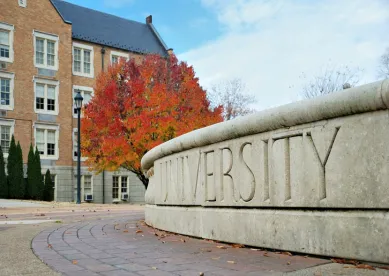Given declining funding from government sources and the continued pressure to minimize tuition increases, it is critical for higher education institutions to encourage private giving. The primary catalyst for private giving is the charitable deduction. Higher education institutions need to promote and support effective use of the charitable deduction and educate their alumni, supporters, and Congressional representatives on how tax reform could affect the ability of institutions to deliver affordable education.
On May 23, 2017, the Treasury Secretary Steven Mnuchin and Gary Cohn of the National Economic Council announced the core principles of the Trump Administration’s tax reform proposal. This proposal includes lowering individual tax rates and doubling the standard deduction which could result in reduced charitable giving. By increasing the standard deduction, many taxpayers will find that their itemized deductions, including their charitable gifts, will be less than the standard deduction, therefore eliminating any tax benefit to the donor for charitable gifts. This could result in millions of taxpayers no longer making charitable gifts. According to a study commissioned by Independent Sector and conducted by Indiana Lilly Family School of Philanthropy, the number of itemizers would be decreased from approximately 33 percent to five percent. Another proposed change would reduce the number of individual income tax rates from seven to three (with brackets to be determined). The House Republican Task Force is also supporting the repeal of the federal estate tax which also disincentivizes charitable contributions.
In order to counter the negative effect on charitable giving, the Independent Sector, a nonprofit organization that advocates for the charitable sector, is supporting and working with Congress and the Trump Administration to make the charitable deduction available to all taxpayers, including non-itemizers. Historically, charitable deductions have only been available to those who itemize their income tax. This proposal has been referred to as the “universal charitable deduction” and would allow an above-the-line deduction for charitable contributions. According to the Independent Sector study, the universal charitable deduction would encourage an increase in giving up to $4.8 billion. This estimate factors in the increase in the standard deduction and the decreases in the marginal tax rates. The Council for Advancement and Support of Education (“CASE”) supports the universal charitable deduction. In a release from CASE dated May 22, 2017, it stated “[a]s we celebrate the 100th anniversary of the charitable deduction, we urge President Trump and Congress to expand this important giving incentive to everyone by enacting a universal charitable deduction.”
Another issue being proposed is repealing or significantly weakening the Johnson Amendment. The Johnson Amendment has been in effect since 1954 and prohibits all Section 501(c)(3) organizations from engaging in political activities such as endorsing or opposing political candidates, including making political contributions. Opponents of the amendment point out that it prohibits 501(c)(3) organizations from supporting candidates or organizations that advocate positions favored by the 501(c)(3) organization. Proponents contend that the amendment protects 501(c)(3) organizations from political pressure. Although the Trump Administration has been primarily focusing on weakening the Johnson Amendment for churches, there are other proposals that would extend the same treatment to all 501(c)(3) organizations.
This article has focused on two issues, charitable income tax deductions and the Johnson Amendment. Although there are other tax reform issues that could impact higher educational institutions, these two are the most significant. This is a great time to make an appointment to visit with your members of Congress. Invite them to your campus and show them the importance of the work performed at your institution. Point out to them the potential effect that tax reform will have on your institution. Also, educate your alumni and other supporters on this topic and encourage them to contact their members of Congress.




 />i
/>i
